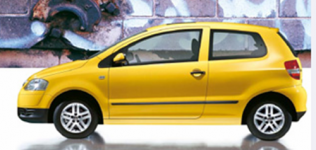The US Senate has finally done something reasonably smart, they voted to raise the fuel economy standards. Now the question is will they back down on some of the regulations that make meeting the standards difficult? As expected, the American auto industry objects, funny but I can't find reports of Honda or Toyota complaining about it. Maybe if the US auto industry embraced what consumers wanted then Toyota and Honda wouldn't be kicking our butts?
In separate news, apparently the requirement to MANDATE ethanol pumps at fuel stations has been repealed. Good thing to, in my opinion. Now if only we can get the diesel emission standards relaxed a little bit we might see some real advances in fuel economy and the development of biodiesel in usable quantities at competitive prices.
In separate news, apparently the requirement to MANDATE ethanol pumps at fuel stations has been repealed. Good thing to, in my opinion. Now if only we can get the diesel emission standards relaxed a little bit we might see some real advances in fuel economy and the development of biodiesel in usable quantities at competitive prices.
Senate passes bill to raise mpg standards
Posted by Candace Lombardi
The U.S. Senate passed a bill Thursday night that would require automakers to sell cars that get significantly better mileage by 2020.
If the bill is also passed by the House of Representatives, Corporate Average Fuel Economy (CAFE) standards will be raised from the current 25 miles per gallon to 35 mpg.
Automakers would still be able to sell trucks and sport utility vehicles that get below the 35 mpg mark in 2020, as long as they have other cars in their lineup to bring up their overall fleet average.
Miles-per-gallon goals for each vehicle class, and a timeline to achieve the 2020 goal incrementally starting in 2011, would be set separately by CAFE regulators. This is the first time since 1975 that the government has sought to raise the standards for new cars and trucks.
The measure would save up to 1 billion gallons of gasoline every day as of 2020, according to Senate Majority Leader Harry Reid.
"For the automakers that still waver on increasing fuel efficiency, I say this: Don't fight this change, embrace it. Embrace this opportunity to build the high-performance, high-efficiency cars and trucks that Americans want to buy and drive--which we so desperately need for the sake of our national security and global warming," Reid said on the Senate floor Friday morning, according to a statement from his office.
The measure is part of the National Energy and Environmental Security Act of 2007, a comprehensive energy bill that also includes incentives for reducing greenhouse gas emissions, developing alternative fuels and implementing energy efficient technology.
Car industry lobbyists, which included General Motors, Ford and the Chrysler group, strongly opposed the bill, arguing that it would hurt American automakers financially if they had to meet such strict standards so soon.
In a last-minute voice vote last night, the bill passed 65-27. governor on Friday to take over the seat.)
Posted by Candace Lombardi
The U.S. Senate passed a bill Thursday night that would require automakers to sell cars that get significantly better mileage by 2020.
If the bill is also passed by the House of Representatives, Corporate Average Fuel Economy (CAFE) standards will be raised from the current 25 miles per gallon to 35 mpg.
Automakers would still be able to sell trucks and sport utility vehicles that get below the 35 mpg mark in 2020, as long as they have other cars in their lineup to bring up their overall fleet average.
Miles-per-gallon goals for each vehicle class, and a timeline to achieve the 2020 goal incrementally starting in 2011, would be set separately by CAFE regulators. This is the first time since 1975 that the government has sought to raise the standards for new cars and trucks.
The measure would save up to 1 billion gallons of gasoline every day as of 2020, according to Senate Majority Leader Harry Reid.
"For the automakers that still waver on increasing fuel efficiency, I say this: Don't fight this change, embrace it. Embrace this opportunity to build the high-performance, high-efficiency cars and trucks that Americans want to buy and drive--which we so desperately need for the sake of our national security and global warming," Reid said on the Senate floor Friday morning, according to a statement from his office.
The measure is part of the National Energy and Environmental Security Act of 2007, a comprehensive energy bill that also includes incentives for reducing greenhouse gas emissions, developing alternative fuels and implementing energy efficient technology.
Car industry lobbyists, which included General Motors, Ford and the Chrysler group, strongly opposed the bill, arguing that it would hurt American automakers financially if they had to meet such strict standards so soon.
In a last-minute voice vote last night, the bill passed 65-27. governor on Friday to take over the seat.)



